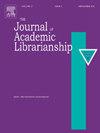Academic librarians in research competitions: A network analysis of resource provision and collaborative dynamics
IF 2.3
3区 管理学
Q2 INFORMATION SCIENCE & LIBRARY SCIENCE
引用次数: 0
Abstract
As an important carrier for cultivating innovative talents and improving the teamwork ability of college students, more and more scholars have paid attention to university research competitions, but most of the previous studies have focused on how the design of scientific research competitions can better improve the effect of talent training, while ignoring what academic resources students are eager to obtain in scientific research competitions from the perspective of students, and what effective support can be provided by instructors such as librarians and professors in scientific research competitions. This study examines how academic librarians’ and professors’ resources and abilities influence scientific research competition collaboration, and explores AI tools’ supporting role. Three scientific research competition cooperation networks involving 40 consultants and 318 students between 2022 and 2024 were analyzed using exponential random graph models (ERGM). We found that students prefer librarians with strong information retrieval skills, literature resources, and library facilities, while valuing professors’ teaching experience, framework guidance, and progress control abilities, while librarians’ research experience, data resources, and professors’ ask disassembly and subject knowledge depth were not the characteristics that were considered in scientific research competition collaboration. Students with complementary competition skills tend to select the same advisors, with disciplinary homophily observed in advisor selection. For AI tools, reading/writing capabilities, code logic, conversational fluency, and translation features were most valued. The difference is that we found that the picture generation capabilities does not play an obvious role in the research competition. The findings demonstrate the distinct roles of librarians and professors in competitions and highlight the importance of skill complementarity in team formation.
学术图书馆研究竞赛:资源供给与合作动态的网络分析
高校科研竞赛作为培养创新人才、提高大学生团队合作能力的重要载体,越来越多的学者开始关注高校科研竞赛,但以往的研究大多集中在科研竞赛的设计如何更好地提高人才培养的效果,而忽略了站在学生的角度出发,学生在科研竞赛中渴望获得哪些学术资源。在科研竞赛中,图书馆员、教授等教师能提供哪些有效的支持?本研究考察了学术图书馆员和教授的资源和能力如何影响科研竞赛合作,并探讨了人工智能工具的支持作用。利用指数随机图模型(ERGM)分析了2022 - 2024年间40名顾问和318名学生参与的三个科研竞赛合作网络。研究发现,学生在科研竞赛合作中不考虑图书馆员的研究经验、数据资源、问题分解和学科知识深度等特征,更看重教授的教学经验、框架指导和进度控制能力,更青睐具有较强信息检索能力、文献资源和图书馆设施的馆员。具有互补竞争技能的学生倾向于选择相同的指导教师,在指导教师的选择中观察到学科同质性。对于人工智能工具来说,读写能力、代码逻辑、会话流畅性和翻译功能是最受重视的。不同的是,我们发现图片生成能力在研究竞争中并没有起到明显的作用。研究结果显示了图书馆员和教授在竞赛中的不同角色,并强调了技能互补性在团队组建中的重要性。
本文章由计算机程序翻译,如有差异,请以英文原文为准。
求助全文
约1分钟内获得全文
求助全文
来源期刊

Journal of Academic Librarianship
INFORMATION SCIENCE & LIBRARY SCIENCE-
CiteScore
5.30
自引率
15.40%
发文量
120
审稿时长
29 days
期刊介绍:
The Journal of Academic Librarianship, an international and refereed journal, publishes articles that focus on problems and issues germane to college and university libraries. JAL provides a forum for authors to present research findings and, where applicable, their practical applications and significance; analyze policies, practices, issues, and trends; speculate about the future of academic librarianship; present analytical bibliographic essays and philosophical treatises. JAL also brings to the attention of its readers information about hundreds of new and recently published books in library and information science, management, scholarly communication, and higher education. JAL, in addition, covers management and discipline-based software and information policy developments.
 求助内容:
求助内容: 应助结果提醒方式:
应助结果提醒方式:


